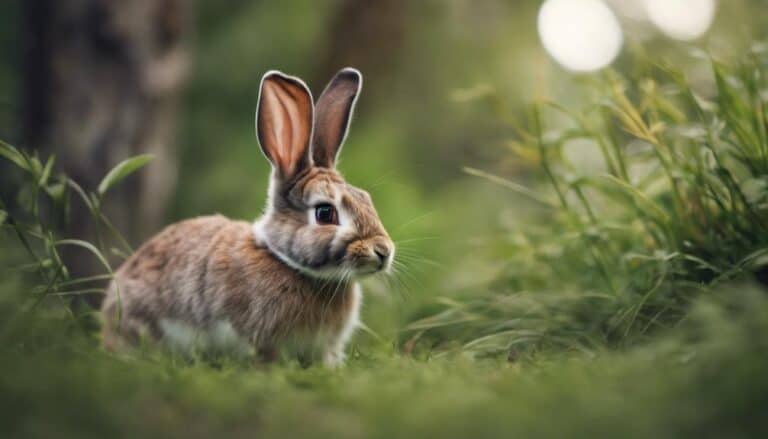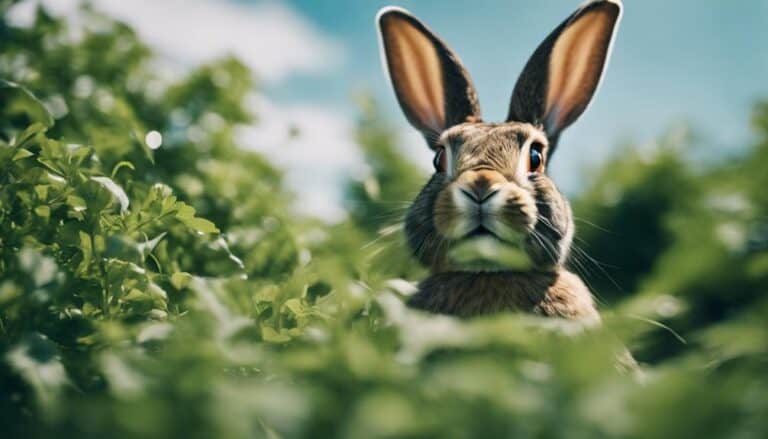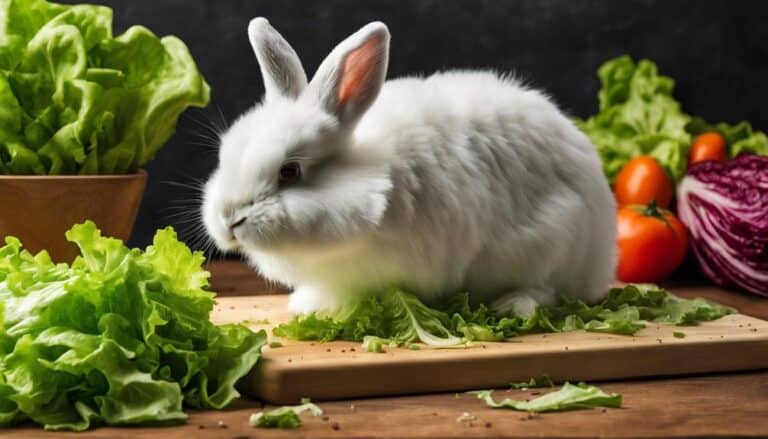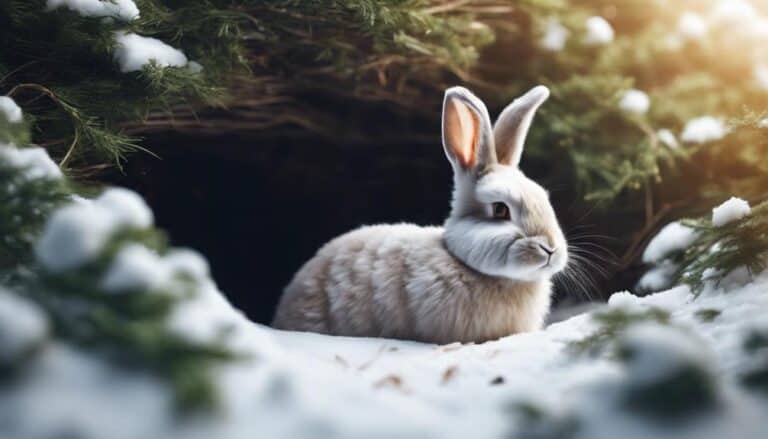So, you're contemplating letting your fluffy bunny nibble on some English ivy, huh?
Well, hold your carrots and hop on over to discover the surprising truth behind this seemingly innocent foliage.
Let's unwrap the mystery surrounding bunnies and English ivy, and why caution should be your new best friend in the garden.
Contents
- 1 Key Takeaways
- 2 English Ivy and Bunny Safety
- 3 Toxicity Concerns With English Ivy
- 4 Health Effects of English Ivy Consumption
- 5 Digestive Issues and English Ivy
- 6 Benefits of Avoiding English Ivy
- 7 Alternatives to English Ivy for Bunnies
- 8 Bunny-Friendly Plants List
- 9 Conclusion: English Ivy and Your Bunny
- 10 Is Cabbage Safe for Bunnies to Eat if English Ivy Isn’t?
- 11 Frequently Asked Questions
- 12 Conclusion
Key Takeaways
- English ivy is toxic to rabbits due to saponin glycosides.
- Ingestion can lead to severe symptoms like diarrhea and internal bleeding.
- Avoid English ivy to prevent harmful health effects in rabbits.
- Opt for bunny-safe plants like parsley, cilantro, and dandelion greens instead.
English Ivy and Bunny Safety
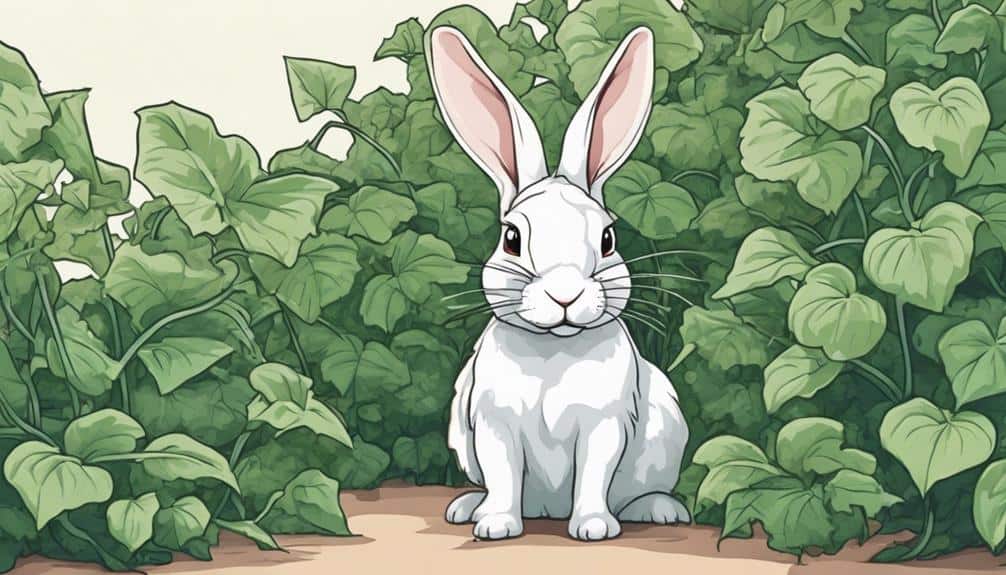
Guarantee the safety of your pet rabbit by comprehending the risks associated with English ivy and the importance of keeping this plant out of their reach. Rabbits are susceptible to the toxic effects of English ivy due to the presence of saponin glycosides in the plant. Ingesting English ivy can result in severe symptoms like diarrhea, internal bleeding, inappetence, and fatigue in rabbits. So, it's vital to make sure that your pet rabbit doesn't have access to this toxic plant to prevent potential health complications.
If a rabbit shows signs of English ivy poisoning, such as diarrhea and lethargy, immediate veterinary attention is necessary. Recognizing the symptoms early and seeking prompt medical intervention can greatly improve the chances of a positive outcome for your beloved pet.
Toxicity Concerns With English Ivy
To guarantee the well-being of your pet rabbit, it's important to comprehend the toxic effects of English ivy due to the presence of saponin glycosides, which can result in severe symptoms such as diarrhea and internal bleeding. English ivy is poisonous to rabbits, and ingestion should be strictly avoided to prevent serious illness and potential harm.
If your rabbit shows symptoms like diarrhea, inappetence, or fatigue post-ingestion of English ivy, it's essential to seek immediate veterinary attention. Monitoring your rabbit closely for any signs of poisoning after exposure to English ivy is crucial to detect and address any issues promptly.
If you suspect that your rabbit has been poisoned by English ivy, it's recommended to contact a vet or an animal poison control hotline for timely intervention and appropriate treatment. Remember, swift action is important in cases of English ivy poisoning to ensure the well-being and health of your beloved pet rabbit.
Health Effects of English Ivy Consumption
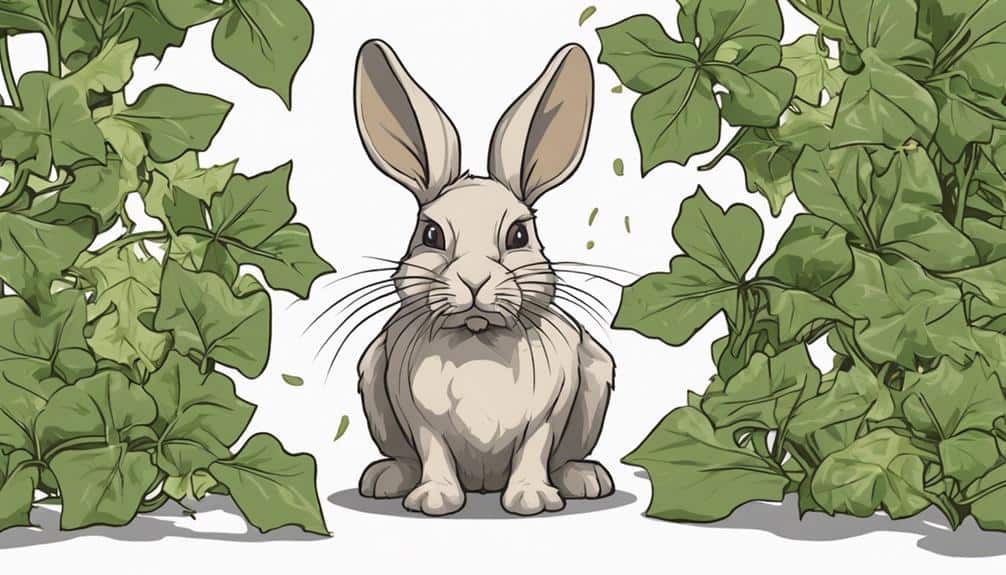
Consuming English ivy can have detrimental health effects on rabbits due to the toxic saponin glycosides present in the plant. When rabbits ingest English ivy, it can lead to a range of health issues:
- Symptoms: Ingestion of English ivy can result in symptoms such as diarrhea and internal bleeding in rabbits.
- Harmful in Small Amounts: Even small amounts of English ivy ingestion can be harmful to rabbits due to the toxic nature of saponin glycosides.
- Veterinary Attention: Rabbits showing any symptoms after consuming English ivy should be promptly taken to a vet for evaluation and treatment.
- Importance of Intervention: Prompt veterinary intervention is vital in cases of English ivy poisoning in rabbits to mitigate the potential harm caused by the toxic compounds.
Be aware of the risks associated with English ivy consumption in rabbits and take immediate action if ingestion occurs to safeguard the well-being of your furry companion.
Digestive Issues and English Ivy
English ivy contains compounds that can potentially lead to digestive issues in rabbits. Ingestion of this plant may result in symptoms such as diarrhea, inappetence, and fatigue.
It's vital to monitor your rabbit closely for any signs of distress if they've consumed English ivy.
Toxicity Concerns
Ingesting English ivy poses a significant risk to rabbits due to its toxic saponin glycosides, which can lead to severe digestive issues like diarrhea. Rabbits can suffer from serious toxicity concerns if they consume English ivy, such as:
- Internal bleeding due to the toxic compounds present in the plant.
- Symptoms like inappetence, lethargy, and gastrointestinal discomfort indicating poisoning.
- The importance of preventing rabbits from accessing English ivy to avoid health complications.
- Immediate veterinary attention is essential if your rabbit shows any signs of English ivy ingestion to guarantee proper poison control, treatment, and care.
Potential Harmful Effects
Exposure to English ivy can result in potential harmful effects on rabbits' digestive systems, primarily due to the toxic saponin glycosides present in the plant. If a rabbit has eaten English ivy, it may experience symptoms such as diarrhea, inappetence, and fatigue. While small amounts of English ivy ingestion may not immediately harm your rabbit, it's essential to monitor for any signs of distress.
Should your rabbit show symptoms like diarrhea or loss of appetite after consuming English ivy, seeking prompt veterinary consultation is recommended. Consulting a vet for important guidance and treatment is essential in addressing any potential toxic effects of English ivy on your rabbit's digestive health. Remember, swift action can help mitigate any harm caused by English ivy ingestion.
Benefits of Avoiding English Ivy
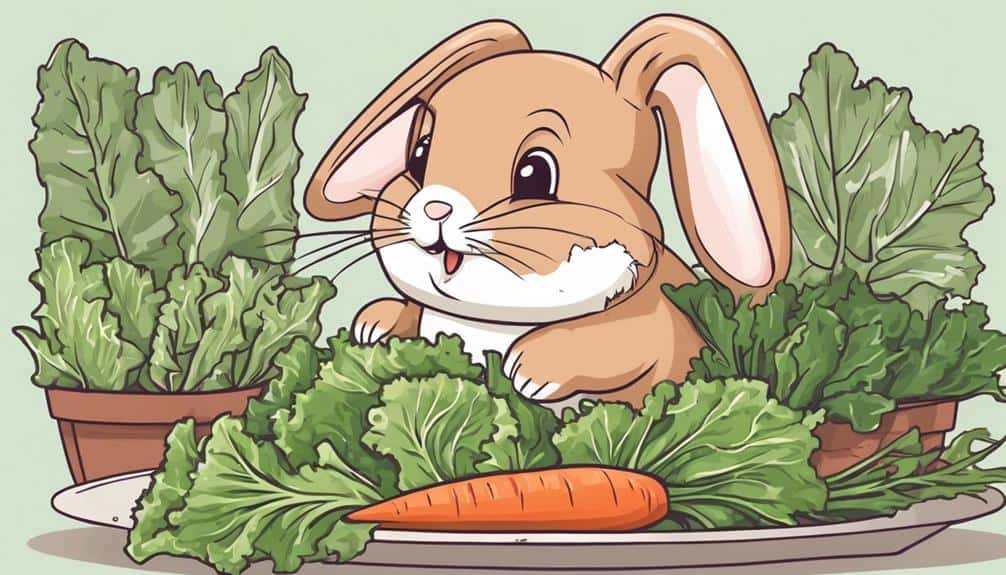
When you choose to avoid English ivy for your bunnies, you're safeguarding their health by preventing potential toxicity. English ivy can pose serious risks to your rabbits, so opting for safe alternatives is essential.
Health Risks of English Ivy
English ivy poses significant health risks to rabbits due to its toxic nature, necessitating the avoidance of this plant to safeguard their well-being. Here are some reasons why it's important to steer clear of English ivy:
- Toxic Components: English ivy contains saponin glycosides, which can lead to serious health issues in rabbits.
- Symptoms: Ingesting English ivy may result in diarrhea, inappetence, and fatigue in rabbits, indicating a need for prompt veterinary care.
- Prevention of Serious Illness: Avoiding English ivy in a rabbit's diet is important to prevent poisoning and safeguard their health.
- Risk Mitigation: Keeping English ivy away from rabbits can significantly reduce the risk of toxicity and maintain their overall well-being.
Toxicity to Bunnies
What risks do bunnies face when exposed to English ivy and how can avoiding it benefit their health?
English ivy poses a significant threat to bunnies due to its toxicity. The saponin glycosides present in English ivy can lead to severe digestive issues in rabbits, such as diarrhea and potential internal bleeding. By steering clear of English ivy in a bunny's diet, you can prevent serious illnesses and promote their overall well-being.
Ingesting this plant can result in symptoms like diarrhea, loss of appetite, and fatigue in rabbits. If you notice any signs of English ivy poisoning in your bunny, immediate veterinary consultation is essential for proper diagnosis and treatment.
Keeping English ivy away from your bunnies is vital to ensure their safety and prevent any potential health complications.
Safe Alternatives for Bunnies
Choosing safe alternatives to English ivy for your bunnies can greatly benefit their health and well-being. Opting for safe alternatives like parsley, cilantro, basil, and dill can provide nutritional benefits without the risks associated with English ivy.
Avoiding English ivy helps guarantee serious health issues and safeguards the well-being of pet rabbits. Providing a varied diet with rabbit-safe herbs and vegetables promotes a balanced nutrition intake for bunnies.
Consulting a veterinarian for guidance on rabbit nutrition and safe food choices can optimize the health of pet rabbits. Remember, incorporating these safe alternatives not only keeps your bunnies healthy but also gives you peace of mind knowing you're providing them with the best care possible.
Alternatives to English Ivy for Bunnies
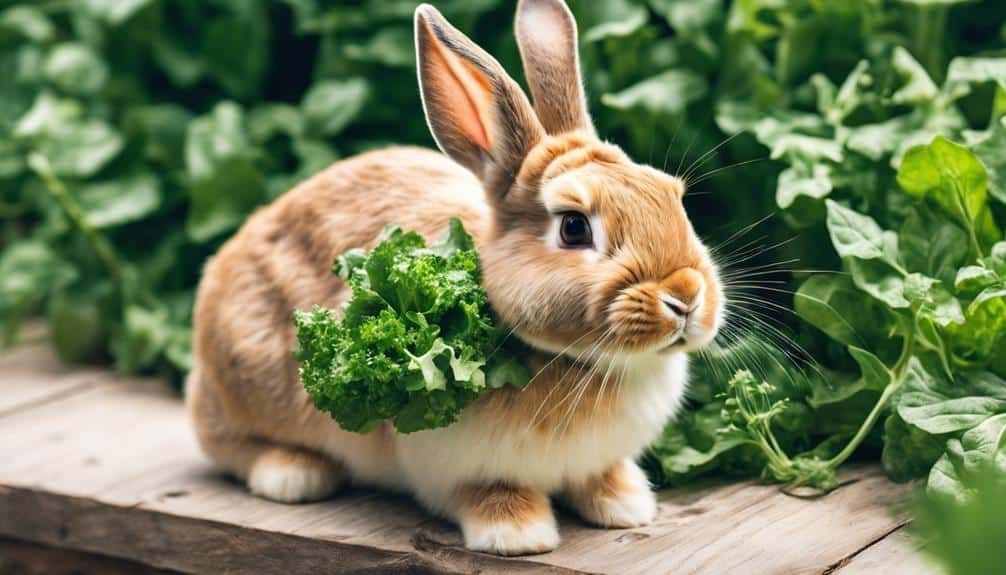
When selecting alternatives to English ivy for your bunny's diet, consider incorporating a variety of rabbit-friendly plants for nutritional diversity and safety. It's important to pick options that are unlikely to cause any harm to your furry friend.
Some excellent choices include parsley, cilantro, and dandelion greens. These plants not only provide essential nutrients but also offer a safe and delicious variety for your rabbit. Additionally, carrot tops, mint, basil, and raspberry leaves are great alternatives that can help make certain your bunny's diet remains balanced and enjoyable.
Treats like apple slices, strawberries, and blueberries can also be given in moderation to add a sweet and healthy twist to their meals. For a more substantial meal, hay such as timothy or orchard grass, along with fresh vegetables like romaine lettuce, kale, and bell peppers, are excellent choices that meet your rabbit's dietary requirements without the potential risks associated with English ivy.
Introducing safe herbs like oregano, thyme, and chamomile can further enrich your rabbit's diet while avoiding any toxicity concerns.
Bunny-Friendly Plants List
To guarantee your bunny's health and safety, acquaint yourself with a detailed list of bunny-friendly plants that can enrich their diet and promote overall well-being. Providing a diverse range of safe plants can greatly benefit your bunny's health and happiness.
Here are some bunny-friendly plants that you can consider incorporating into their diet:
- Parsley: The leaves of the parsley plant are rich in vitamins and minerals, making them a nutritious addition to your bunny's diet.
- Cilantro: Cilantro, also known as coriander, is safe for bunnies and adds a fresh flavor to their meals.
- Dill: Dill is a safe herb for bunnies to consume and can provide them with additional nutrients.
- Mint: Mint leaves are safe for bunnies and can offer a revitalizing taste for your furry friend.
These plants not only offer varied flavors but also contain essential nutrients that can contribute to your bunny's overall well-being. Remember to introduce new plants gradually and observe your bunny's reaction to make sure they tolerate them well.
Conclusion: English Ivy and Your Bunny

English Ivy poses a significant threat to the health of your bunny due to its toxic nature containing saponin glycosides that can lead to severe gastrointestinal issues. Rabbits should never eat English Ivy as it can cause diarrhea, inappetence, and fatigue, potentially leading to serious health complications. If your bunny ingests English Ivy, urgent veterinary consultation is vital for proper diagnosis and treatment. To highlight the dangers of English Ivy for rabbits, consider the following table:
| English Ivy and Your Bunny | |
|---|---|
| Toxic Component | Saponin Glycosides |
| Potential Effects | Severe Gastrointestinal Issues |
| Symptoms | Diarrhea, Inappetence, Fatigue |
| Action Needed | Urgent Veterinary Consultation |
Is Cabbage Safe for Bunnies to Eat if English Ivy Isn’t?
Yes, bunnies can safely eat cabbage as a part of their diet. While English ivy is toxic to rabbits, cabbage is a safe and healthy option for them. However, it should be fed in moderation to avoid causing digestive issues. Overall, bunnies can enjoy cabbage as a part of a balanced diet.
Frequently Asked Questions
Can Rabbits Eat English Ivy?
Avoid feeding rabbits English ivy due to Ivy toxicity. It contains saponin glycosides, leading to severe symptoms like diarrhea and internal bleeding. Immediate veterinary attention is necessary if signs of poisoning, such as fatigue, appear.
How Much Ivy Is Poisonous to Rabbits?
When it comes to ivy toxicity in rabbits, even small amounts can be harmful. Watch for signs like diarrhea and fatigue post-ingestion. Seek immediate veterinary care if symptoms arise. Always prioritize your bunny's well-being.
What Plants Are Poisonous to Rabbits?
Avoid toxic plants like nightshade, hydrangea, lily, and cannabis around rabbits. Poisonous flora can cause severe symptoms, such as organ damage and potential death. Keep these harmful plants away from your furry friends to guarantee their safety.
Can Rabbits Have Ground Ivy?
When considering ivy treats for your bunnies, avoid ground ivy. It's toxic, causing digestive issues. Keep your rabbits safe by steering clear of this plant. If signs of poisoning appear, consult a vet promptly.
Conclusion
In conclusion, it's imperative to remember that bunnies should never eat English ivy due to its toxic nature.
The saponin glycosides present in English ivy can cause serious health issues for rabbits, such as diarrhea and internal bleeding.
To ensure the well-being of your furry friend, always opt for bunny-friendly plants and avoid English ivy at all costs.
Remember, when it comes to your bunny's diet, prevention is key to a hoppy and healthy life.

